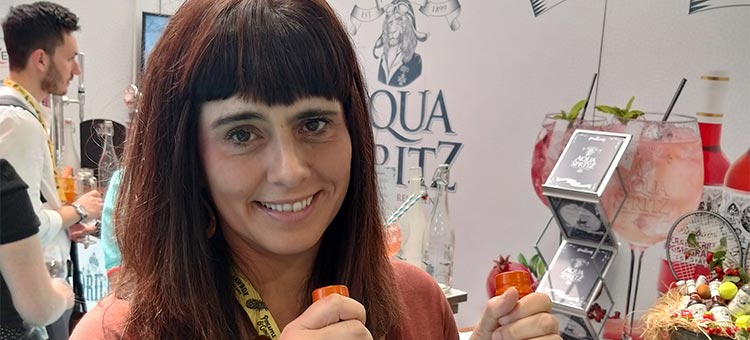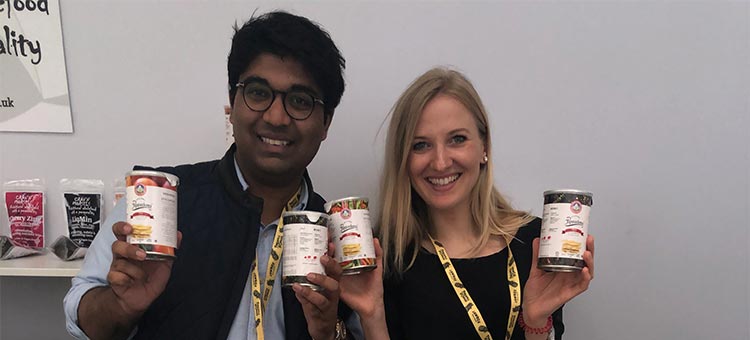London: Masses of delicious food and drink were on the menu at two interlinked events staged in the capital’s Olympia exhibition centre, drawing thousands thirsty and hungry people during its 2-day run which ended on July 1. Imbibe Live celebrated its tenth anniversary with a staggering range of alcoholic and non-alcoholic drinks and nibbles whilst the Snack Show run alongside made a spirited debut.
As usual, India made its mark with its spices and ingredients turning up on various stands. Uncle Saba’s Poppadoms, scored a big hit at Olympia. Its director Sreenivas Saba co-founded the company with his father in 2015 and now more than 25 countries are munching their way through 10 different flavours, including chilli, barbecue and tomato.
Sreenivas told us: “Our products, seasoned with salt, cumin and carom seeds, have less saturated fat and are gluten-free, cholesterol-free, high in fibre and protein and suitable for vegans and halal-conscious customers. We pride ourselves in putting a lot of love and care into each bite.” His father previously owned a multi-national company in Singapore buying and selling poppadoms, pickles, spices, rice, onions, mangoes and fresh cashew nuts. They have a plant in Tamil Nadu.
Destination Reporter India also met Eugene Slattery who was offering people spoonfuls of his ViP nuts, a nut resembling an eye-catching dot as the letter ‘i’ in his publicity leaflets. The company, New York Delhi, produces nine varieties of flavoured nuts like lemon chilli, hot chilli and bollywood barbecue. He and Nina, his Indian wife and co-director, met when they were both art students. “We spotted a gap in the market,” Eugene said. “Previously peanuts came in just one or two flavours and we had a go at expanding the range, with the help of Nina’s grandmother’s spice recipes.” They began by producing “premium quality spices” which were quickly snapped up by top stores like Fortnum and Masons and then branched into nuts as well, now exporting to more than 22 countries. “We have big plans for the future,” he said, with new flavours and products. Customers include 5-star hotels, bars, theatres, stores and airlines. People who tried their nuts nodded their approval. “Very tasty and crunchy,” was a typical compliment.
Kerry Irwin, national sales account manager for Fitzpatrick’s told us her company produced 28 dilatable cordial drinks and the one that caught our eye was labelled Lemon Yuzu turmeric. “We launched this drink,” she said, “because turmeric has so many health benefits and it is selling very well.” Her company makes solely non-alcoholic drinks, inspired by the Temperance Movement set up way back in 1835 specifically to oppose the widespread use of alcohol in Britain at the time and pointing out the dangers of “the demon drink”. Fitzpatrick, the original founder, was an Irish herbalist who came to Britain, determined to spread his philosophy of abstinence, and achieved notable success. His first temperance bar is still serving customers, its ancient shelves lined with jars of medicinal herbs, roots and extracts. “We have won many awards for our healthy drinks,” Kerry told us.
Sudhir Singh, UK partner and international sales director of Laplandia Vodka, smiled as he watched visitors’ eyes widen as they tried his strong products which come in 12 flavours. The company started in Lapland in 2017 and is doing well, exporting to 22 countries. He told us. “Within three months we shall add India to our list,” he added, proudly. He said vodka ice-cream would also be widely available soon.
Other firms too planned to target India, like Lucy Warhurst’s Percival and Company. An active woman, she had always yearned to relax with a “refreshing and invigorating drink” but could never find exactly what she wanted, so she set up her own business in 2017, producing drinks with only 4 per cent alcohol minus the sugar and calorie content of similar soft drinks. Brought up on a farm, she already knew how to make elder flower cordials and has added rose and juniper flavours to her list. “My drinks are light and refreshing, sure to appeal to people in India,” she said.
Visitors moved from stand to stand, downing samples of whisky, rum, gin, vodka, beer and an array of wines. Crisps and other snacks were on offer everywhere along with tea and coffee.
Seminars included the power of snacking which focused on the industry’s future and how technology could help to take advantage of future opportunities. Snacking and portion size was another meeting to discuss reducing the amounts of food offered to customers, cutting calorie intake and improving health all round.
Other seminars spanned the plastic epidemic, demanding change that “prioritises our planet over profit and convenience”. Matching food and drink was the subject of several talks and wine was featured in several masterclasses.






